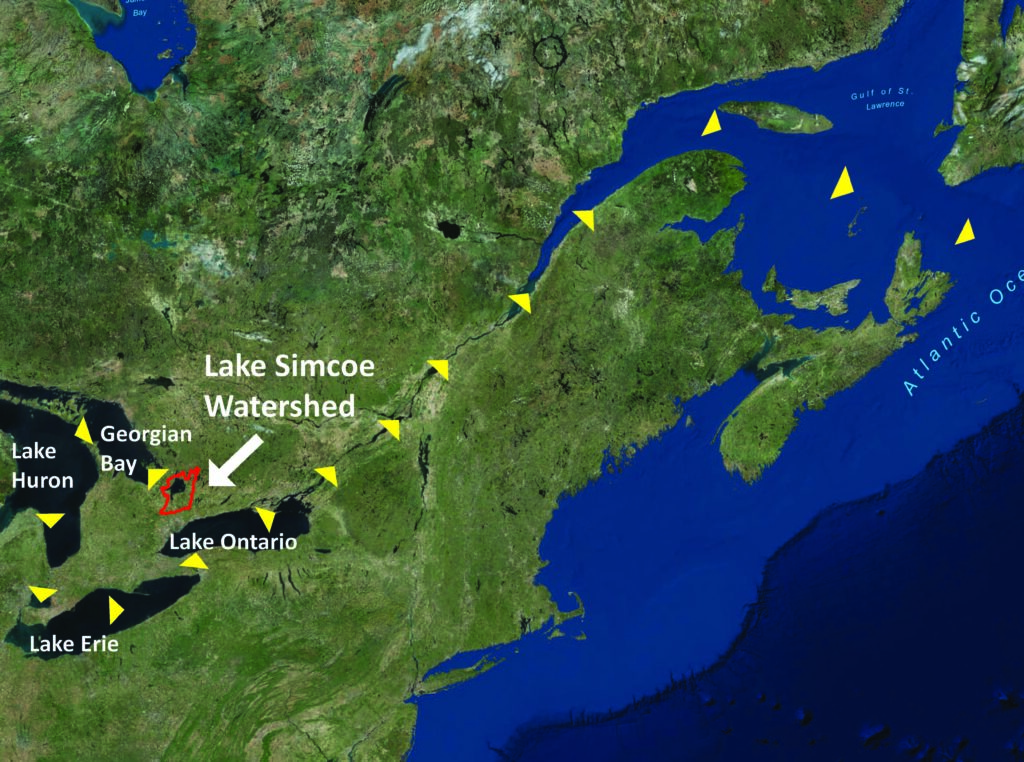Lake Simcoe Conservation Matters
Microplastics are the last straw!
Every minute of every day a garbage truck’s worth of plastic enters the ocean. Microplastics including microbeads and other plastic pollution have not only floated into our oceans and fresh water systems, they’ve drifted into media headlines and seeped into our consciousness over the past 15 years.
Plastic water bottles and caps, food wrappers, cigarette butts, plastic bags, plastic straws of all types and even coffee stir sticks, contribute to the eight to 11 million tons of plastic pollution that enter the oceans every year. They slowly break down into microplastics which can be harmful to fish, birds, turtles, and other wildlife.
Canadians throw out about 57 million single-use plastic straws every day.
Every minute of every day a garbage truck’s worth of plastic enters the ocean. Microplastics including microbeads and other plastic pollution have not only floated into our oceans and fresh water systems, they’ve drifted into media headlines and seeped into our consciousness over the past 15 years.
Plastic water bottles and caps, food wrappers, cigarette butts, plastic bags, plastic straws of all types and even coffee stir sticks, contribute to the eight to 11 million tons of plastic pollution that enter the oceans every year. They slowly break down into microplastics which can be harmful to fish, birds, turtles, and other wildlife.
Canadians throw out about 57 million single-use plastic straws every day.
Microplastics are tiny pieces of plastic found in the environment.
They are smaller than five millimetres which is about the size of a sesame seed. Microplastics come from many sources including microbead “scrubbers” in exfoliating hand cleansers and facial scrubs, cosmetics, clothing, and industrial processes and air blasting technology. When larger plastic debris, at sea or on land, degrades, it forms microplastics. Sources include manufacturing debris, consumer litter, wear-and-tear from tires, fibres from cigarette butts, synthetic rope and fabrics. It’s a colossal microplastic mess!
Microplastics have been found in all the Great Lakes and the St. Lawrence River.
Studies have shown that microplastics may block the digestive system of some fish, take up space that real food should occupy and may contain harmful toxins. We know that plastic litter is a problem in the Great Lakes and the Lake Simcoe Watershed. Could microplastics be impacting fish and other aquatic life in the Great Lakes and Lake Simcoe? Researchers are currently studying the water, sediment, and sport fish to find out. It’s vital to determine the impacts of microplastics in aquatic ecosystems so that steps can be taken to reduce or eliminate the sources. It’s a work in progress.

The Lake Simcoe watershed is part of the Atlantic Ocean watershed. Water travels from Lake Simcoe into Lake Couchiching and into Lake Huron’s Georgian Bay. It then continues to flow through the Great Lakes-St. Lawrence seaway system and into the Atlantic Ocean.
The North Atlantic garbage patch is completely made up of manmade debris found within the North Atlantic Gyre.
A gyre is a spiral motion like a giant circular oceanic surface current. This particular patch – and there are four others on the planet – is estimated to be hundreds of kilometres across, with a density of 200,000+ pieces of debris per square kilometre. An estimated 70 per cent of the trash ends up on the ocean floor, and some of it is consumed by marine life.
This perplexing problem is a result of society’s love affair with cheap, convenient, and durable plastic products that take four hundred years or longer to break down after we discard them. No one really knows how long plastics will persist in the ocean. The love is fading.
Annual consumption of plastic bottles is set to top half a trillion by 2021, far outstripping recycling efforts and jeopardizing oceans, coastlines and other environments (The Guardian, 28 June 2017)
How can we stem the tide of microplastics entering our precious water bodies?
One person’s positive actions may seem like a drop in the ocean. But when you combine the individual efforts of millions of people, innovative businesses and governments, it adds up to millions of opportunities to reduce and prevent plastic pollution.
Microbeads have been listed as a toxic substance in the Canadian Environmental Protection Act (CEPA). As of July 1, 2019 the manufacture, import and sale of toiletries containing microbeads will be prohibited in Canada. Local grassroots initiatives, large food service companies, hotels, airlines, and cruise lines are all taking steps towards ditching plastic straws.
When we protect our bodies of water, we protect our own bodies. What can you do? Don’t live a “plastic” life. Start small, but start…
Reduce – Reuse – Recycle – Repair – Repurpose
- Don’t use plastic straws – choose stainless steel, silicone, glass, paper, bamboo or titanium
- Take reusable shopping bags to the store
- Bring your own thermos to the coffee shop
- Use a stainless steel or glass water bottle
- Choose paper over plastic bags
- Choose personal care products without microbeads (listed as polypropylene or polyethylene)
- Use a razor that lets you replace just the blade
- Choose reusable cloth diapers
- Use glass jars and containers to store food
- Bring your own container to restaurants to take leftovers home
- Reduce packaging waste – shop in bulk and bring your own containers
- Secure your recycling on pickup day so it doesn’t blow into nearby rivers and greenspaces
The Holiday Season is here.
The perfect time to spark change in our thinking and actions. Can we find sustainable alternatives to plastic and choose more eco-friendly gifts for family, friends and colleagues? Definitely. With a dash of imagination and creativity, you’ll be amazed at how the most personal and unique gifts can come from the heart. Yours will be a gift to Lake Simcoe, to our oceans, and to future generations. A gift that’s appreciated and . . . free of plastic.
Contact Customer Service:
Phone: 905-895-1281
Toll Free: 1-800-465-0437
Email:  info@LSRCA.on.ca
info@LSRCA.on.ca

